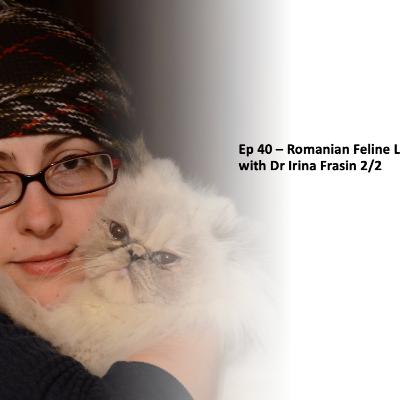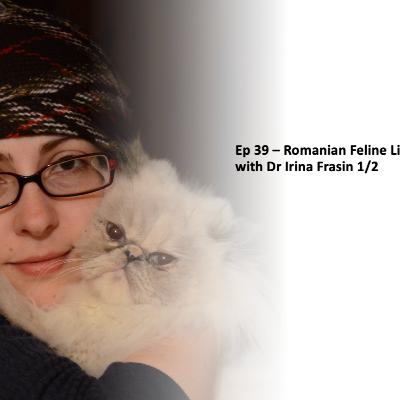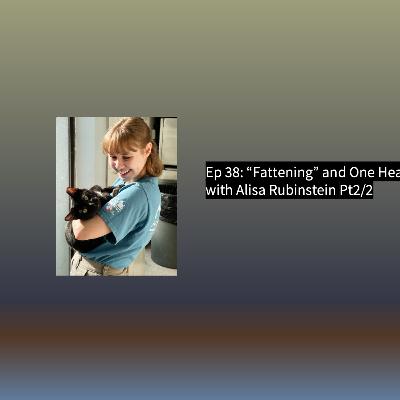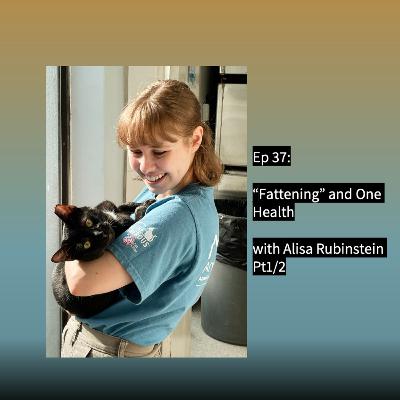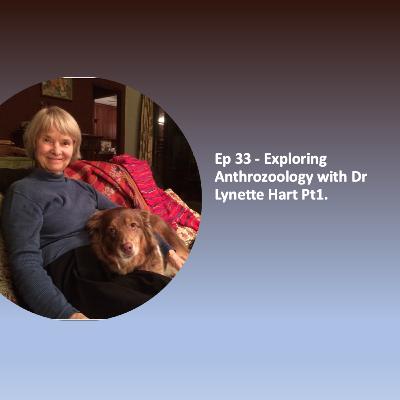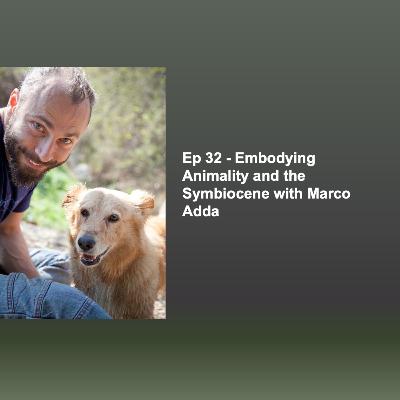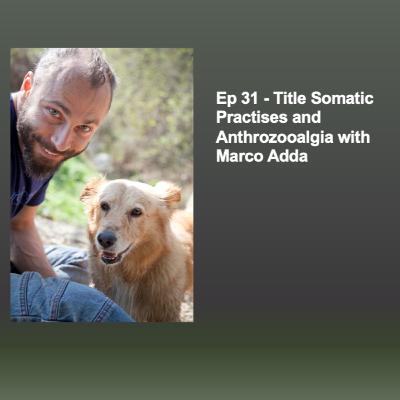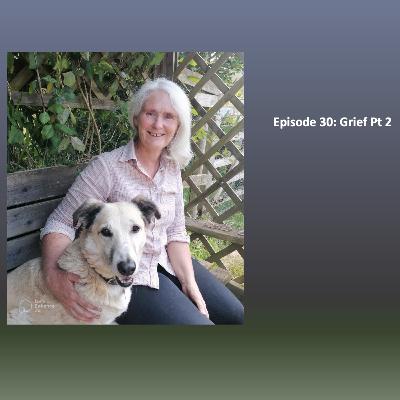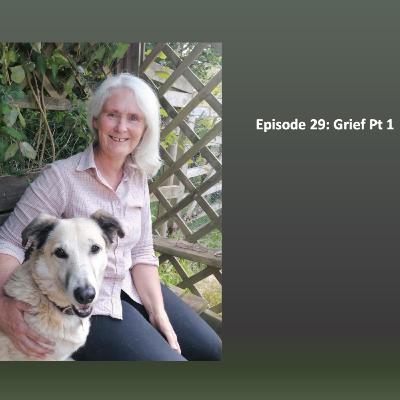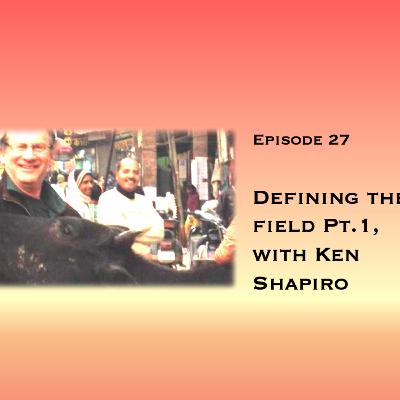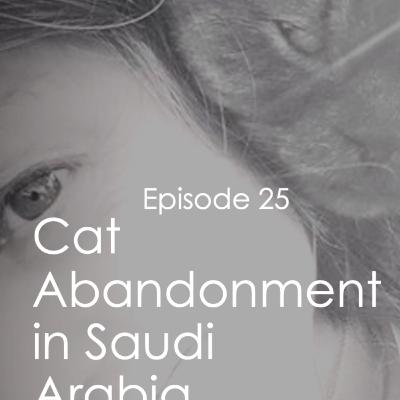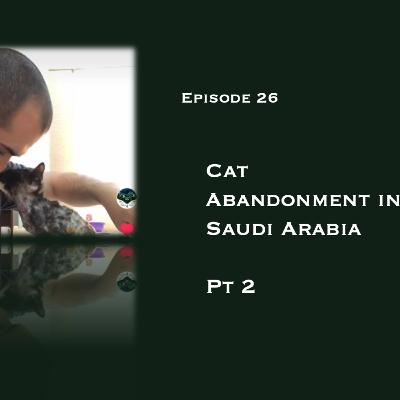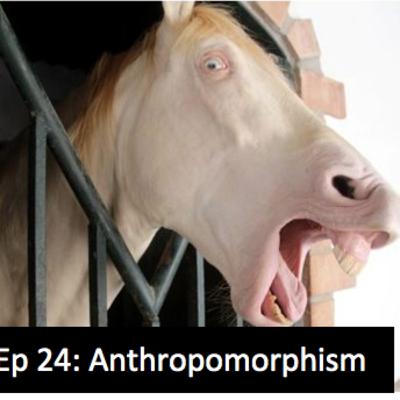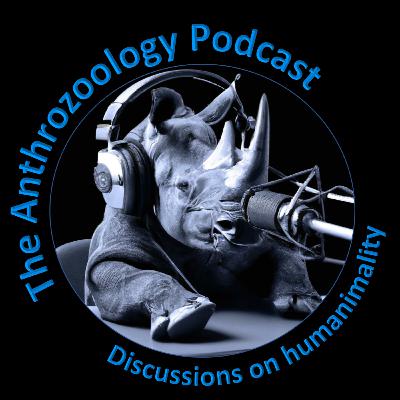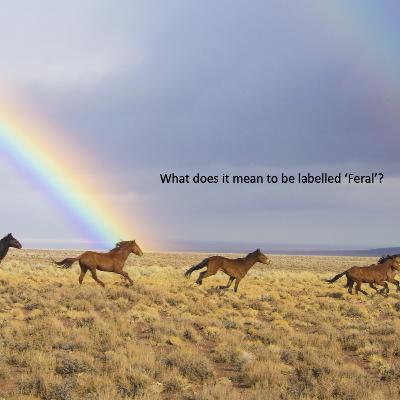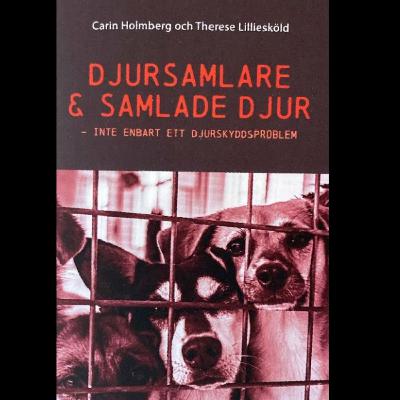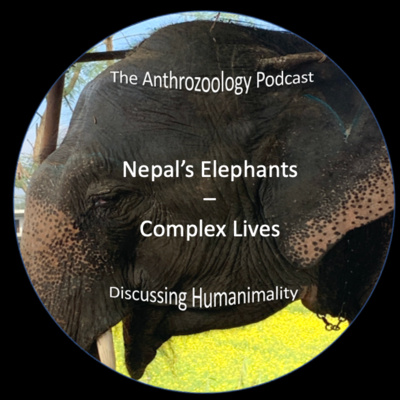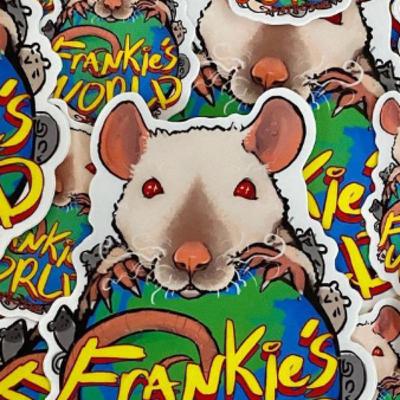Discover The Anthrozoology Podcast
The Anthrozoology Podcast

The Anthrozoology Podcast
Author: Anthrozoology Podcast
Subscribed: 13Played: 96Subscribe
Share
© Anthrozoology Podcast
Description
The Anthrozoology Podcast is a place for early career researchers to discuss current topics in the field. Hosted by a PodCrew of three early career researchers, these episodes focus on our complex relationships with other species ranging from companion animals to sharks, elephants and beyond. Each episode invites guest researchers, or PodLets, to enter a lively discussion on a range of anthropological issues.
PodCrew are:
Dr. Kris Hill Ph.D. Candidate, Dr. Michelle Szydlowski , Sarah Oxley Heaney Ph.D. Candidate. Find us at @anthrozoopod on Facebook, TikTok and X.
PodCrew are:
Dr. Kris Hill Ph.D. Candidate, Dr. Michelle Szydlowski , Sarah Oxley Heaney Ph.D. Candidate. Find us at @anthrozoopod on Facebook, TikTok and X.
46 Episodes
Reverse
In episode 40 of the Anthrozoology Podcast we continue our conversation with, Dr. Irina Frazin discusses the challenges faced by NGOs in Romania, including difficulties in building trust and networks, and the complexities of legal obligations for cat microchipping and the issue of ear tipping for sterilised cats. Irina shares her experience with a severely injured cat who transforms from a non-social cat to a loving companion. She also addresses the problem of community cat abandonment and the need for better support networks for companion animal guardians. The conversation touches on the historical association of cats with the feminine and the evolution of the "crazy cat lady" trope.
Please subscribe to get notified about our next podcast!
Follow us on Twitter: @TheAnthrozoopod
Follow us on Facebook: https://www.facebook.com/anthrozoopod/
Follow us on TikTok @anthrozoology_
To access audio versions please our official Website: https://anthrozoopod.wixsite.com/anthrozoopod
PodCrew
Dr.Kris Hill
https://academiccatlady.com/
Dr. Michelle Szydlowski ms835@exeter.ac.uk www.internationalelephants.org@intl_elephants
Sarah Oxley Heaney
PhD Candidate, University of Exeter
sh750@exeter.ac.uk
www.kissingsharks.com/
Podlet Guest
Dr Irina Frasin
irina.anthrozoology@gmail.com
https://anthrozoology.acadiasi.org/en/home/
References
Frasin, I “Of Cats and Women: A Cultural History of a Relationship” in Anthrozoology Studies: Animal Life and Human Culture, I. Frasin, G. Bodi, S. Bulei, C. Dinu Vasiliu, Eds. (Presa Universitară Clujeană, Cluj-Napoca, Romania, 2022), pp. 158–182.
http://www.editura.ubbcluj.ro/bd/ebooks/pdf/3343.pdf
Frasin I. “Cat Sanctuary. Co-existence with community cats” in Anthrozoology studies. Non-Human Animals in Open Societies, I. Frasin, G. Bodi, S. Bulei, C. Dinu Vasiliu Eds. (Presa Universitară Clujeană, Cluj-Napoca, Romania, 2023) pp. 112 -146.
http://www.editura.ubbcluj.ro/bd/ebooks/pdf/3839.pdf
Frasin I. “Portraits for community cats - the story of a more-than-human relationship” Multispecies Communities and Narratives, I. Frasin, G. Bodi, S. Bulei, C. Dinu Vasiliu Eds. (Presa Universitară Clujeană, Cluj-Napoca, Romania, 2024) pp. 161-184. http://www.editura.ubbcluj.ro/bd/ebooks/pdf/4365.pdf
Frasin I. “Co-existence with community cats” Colloquium Series by Animals and Society Institute
https://www.youtube.com/watch?v=lb2hHVZg-_I&list=PL3vTRlNA7pSmLDrnXV83_C5YuhT5YPam4&index=2
In episode 39 of the Anthrozoology Podcast we join Dr. Irina Frazin, for part one of two on a discussion on Romanian Feline Lives. Irina is a researcher at the Institute of Social and Economic Research, who discusses her journey from classical studies to anthrozoology, sparked by adopting her cat Bubus 15 years ago. Irina highlights the challenges of translating human-animal studies terminology into Romanian and the success of the Anthrozoology Symposium, which initially attracted more international than local participants. Irina also details her efforts to establish an anthrozoology course at the University of Iasi, despite several challenges, and emphasises the importance of fostering programs for cats in Romanian shelters. She notes the need for better education and collaboration among NGOs to improve animal welfare.
Please subscribe to get notified about our next podcast!
Follow us on Twitter: @TheAnthrozoopod
Follow us on Facebook: https://www.facebook.com/anthrozoopod/
Follow us on TikTok @anthrozoology_
To access audio versions please our official Website: https://anthrozoopod.wixsite.com/anthrozoopod
PodCrew
Dr.Kris Hill
https://academiccatlady.com/
Dr. Michelle Szydlowski ms835@exeter.ac.uk www.internationalelephants.org@intl_elephants
Sarah Oxley Heaney
PhD Candidate, University of Exeter
sh750@exeter.ac.uk
www.kissingsharks.com/
Podlet Guest
Dr Irina Frasin
irina.anthrozoology@gmail.com
https://anthrozoology.acadiasi.org/en/home/
References
Frasin, I “Of Cats and Women: A Cultural History of a Relationship” in Anthrozoology Studies: Animal Life and Human Culture, I. Frasin, G. Bodi, S. Bulei, C. Dinu Vasiliu, Eds. (Presa Universitară Clujeană, Cluj-Napoca, Romania, 2022), pp. 158–182.
http://www.editura.ubbcluj.ro/bd/ebooks/pdf/3343.pdf
Frasin I. “Cat Sanctuary. Co-existence with community cats” in Anthrozoology studies. Non-Human Animals in Open Societies, I. Frasin, G. Bodi, S. Bulei, C. Dinu Vasiliu Eds. (Presa Universitară Clujeană, Cluj-Napoca, Romania, 2023) pp. 112 -146.
http://www.editura.ubbcluj.ro/bd/ebooks/pdf/3839.pdf
Frasin I. “Portraits for community cats - the story of a more-than-human relationship” Multispecies Communities and Narratives, I. Frasin, G. Bodi, S. Bulei, C. Dinu Vasiliu Eds. (Presa Universitară Clujeană, Cluj-Napoca, Romania, 2024) pp. 161-184. http://www.editura.ubbcluj.ro/bd/ebooks/pdf/4365.pdf
Frasin I. “Co-existence with community cats” Colloquium Series by Animals and Society Institute
https://www.youtube.com/watch?v=lb2hHVZg-_I&list=PL3vTRlNA7pSmLDrnXV83_C5YuhT5YPam4&index=2
Welcome to Episode 38 of the Anthrozoology Podcast. In this episode, we continue exploring Alisa Rubinstien’s research on the intersection of humans, companion-animals and fat. Alisa is the AIP2023/AASA (https://www.youtube.com/watch?v=TEmj7S9A0fY&t=2020s) Pre-PhD Presentation Award winner for her work titled “Fattening” One Health: An Interspecies Approach to Dismantling the “Obesity Epidemic.”
With over ten years of experience in various animal care settings, she recently earned her Master’s in Anthrozoology from Canisius University. Currently, Alisa serves as the Lifesaving Manager at a shelter in Philadelphia, focusing on adoption, foster, and volunteer programs. Her academic interests intersect ecofeminism and critical animal studies, particularly exploring how perceptions of animals relate to marginalised humans. Her thesis investigated the roles cats play in the lives of queer women and non-binary individuals.
In the second part of their conversation, hosts Kris, Sarah, and Michelle continue their dialogue with Alisa, who discusses potential future research directions, emphasising the need for a better understanding of how societal perceptions can influence the health outcomes of both humans and animals. The discussion also highlights her fascinating thesis on the relationships between queer women and their cats, showcasing how these unique bonds challenge societal narratives. As the episode concludes, Alisa highlights the critical need for compassion and dignity in healthcare, advocating for a One Welfare approach that benefits all beings. This engaging conversation encourages listeners to rethink conventional beliefs about health, weight, and the integral connections we share with animals.
In a future episode we talk to another AIP2023 awardee, Dr. Madelena Mañetto Quick, who recently graduated from Te Herenga Waka – Victoria University of Wellington, New Zealand. You can learn more about the Anthrozoology as International Practice (AIP) student conference here https://anthrozoologyconference.com/
Please subscribe to get notified about our next podcast!
Follow us on Twitter: @TheAnthrozoopod
Follow us on Facebook: https://www.facebook.com/anthrozoopod/
Follow us on TikTok @anthrozoology_
To access audio versions please our official Website: https://anthrozoopod.wixsite.com/anthrozoopod
Podlet Guest
Alisa Rubinstein
Email: alisar3497@gmail.com
Websites: https://www.linkedin.com/in/alisar01/
PodCrew
Dr. Kris Hill
https://academiccatlady.com/
Dr. Michelle Szydlowski
ms835@exeter.ac.uk
www.internationalelephants.org
@intl_elephants
Sarah Oxley Heaney PhD Candidate,
University of Exeter
sh750@exeter.ac.uk
www.kissingsharks.com/
References
Pearl RL, Wadden TA, Bach C, Leonard SM, Michel KE. (2020). Who's a good boy? Effects of dog and owner body weight on veterinarian perceptions and treatment recommendations. International Journal of Obesity, 44(12): 2455-2464. https://pmc.ncbi.nlm.nih.gov/articles/PMC7686094/
Cats (and their Dykes): An Anthology. Edited by Irene Reti and Shoney Sien. C. (1991). McNaughton and Gunn: https://escholarship.org/content/qt4wn4458v/supp/CATS.pdf
Maintenance Phase (Podcast). Wellness and weight loss, debunked and decoded:
https://www.maintenancephase.com/
Anthrozoology as International Practice (AIP) YouTube Channel: https://www.youtube.com/@aipconference/playlists
Alisa’s AIP2021 presentation: https://www.youtube.com/watch?v=TEmj7S9A0fY&list=PL-78-9WPsOo8f8kCP8j96FENDLHvkVv1K&index=4
Read more about AIP and register here (before 17 November 2024): https://anthrozoologyconference.com/companion animals
Welcome to Episode 37 of the Anthrozoology Podcast. In this episode, we explore Alisa Rubinstien’s research on the intersection of humans, companion-animals and fat. Alisa is the AIP2023/AASA (https://www.youtube.com/watch?v=TEmj7S9A0fY&t=2020s) Pre-PhD Presentation Award winner for her work titled “Fattening” One Health: An Interspecies Approach to Dismantling the “Obesity Epidemic.” With over ten years of experience in various animal care settings, she recently earned her Master’s in Anthrozoology from Canisius University. Currently, Alisa serves as the Lifesaving Manager at a shelter in Philadelphia, focusing on adoption, foster, and volunteer programs. Her academic interests intersect ecofeminism and critical animal studies, particularly exploring how perceptions of animals relate to marginalised humans. Her thesis investigated the roles cats play in the lives of queer women and non-binary individuals.
NB In a future episode we talk to another AIP2023 awardee, Dr. Madelena Mañetto Quick, who recently graduated from Te Herenga Waka – Victoria University of Wellington, New Zealand. You can learn more about the Anthrozoology as International Practice (AIP) student conference here https://anthrozoologyconference.com/
Please subscribe to get notified about our next podcast!
Follow us on X: @TheAnthrozoopod
Follow us on Facebook: https://www.facebook.com/anthrozoopod/
Follow us on TikTok @anthrozoology_
To access audio versions please our official Website: https://anthrozoopod.wixsite.com/anthrozoopod
Podlet Guest
Alisa Rubinstein
Email: alisar3497@gmail.com
Websites: https://www.linkedin.com/in/alisar01/
PodCrew
Dr. Kris Hill PhD Candidate, University of Exeter
tinehill@gmail.com
https://katzenlife.wordpress.com/
Dr. Michelle Szydlowski
ms835@exeter.ac.uk
www.internationalelephants.org
@intl_elephants
Sarah Oxley Heaney PhD Candidate, University of Exeter
sh750@exeter.ac.uk
www.kissingsharks.com/
References
Pearl RL, Wadden TA, Bach C, Leonard SM, Michel KE. (2020). Who's a good boy? Effects of dog and owner body weight on veterinarian perceptions and treatment recommendations. International Journal of Obesity, 44(12): 2455-2464.https://pmc.ncbi.nlm.nih.gov/articles/PMC7686094/
Cats (and their Dykes): An Anthology. Edited by Irene Reti and Shoney Sien. C. (1991). McNaughton and Gunn: https://escholarship.org/content/qt4wn4458v/supp/CATS.pdf
Maintenance Phase (Podcast). Wellness and weight loss, debunked and decoded:
https://www.maintenancephase.com/
Anthrozoology as International Practice (AIP) YouTube Channel: https://www.youtube.com/@aipconference/playlists
Alisa’s AIP2021 presentation: https://www.youtube.com/watch?v=TEmj7S9A0fY&list=PL-78-9WPsOo8f8kCP8j96FENDLHvkVv1K&index=4
Join us for episode 33 as we dive into the rich history and evolving future of anthrozoology with our guest, Dr. Lynette Hart. Dr. Hart is the Department Vice Chair and Professor of Population Health and Reproduction at UC Davis's School of Veterinary Medicine. Her research focuses on human - morethanhuman-animal interactions, animal behaviour, and welfare. She is also one of the founders of the field of anthrozoology and the International Society for Anthrozoology (ISAZ); as well as the recipient of the ISAZ Distinguished Anthrozoologist award for outstanding lifetime achievement. This episode is part 1 of a two-part conversation with Dr Hart and covers a wide range of topics including the history and future of anthrozooology, animal welfare, research funding and the importance of interdisciplinary research and collaboration in anthrozoology.
Please subscribe to get notified about our next podcast!
Follow us on Twitter: @TheAnthrozoopod
Follow us on Facebook: https://www.facebook.com/anthrozoopod/
Follow us on TikTok @anthrozoology_
To access audio versions please our official Website: https://anthrozoopod.wixsite.com/anthrozoopod
PodCrew
Dr. Kris Hill
https://academiccatlady.com/
Dr. Michelle Szydlowski
ms835@exeter.ac.uk
www.internationalelephants.org
@intl_elephants
Sarah Oxley Heaney
PhD Candidate,
University of Exeter
sh750@exeter.ac.uk
www.kissingsharks.com
Podlet Guest
Dr Lynette Hart
email: lahart@ucdavis.edu
Websites:
https://profiles.ucdavis.edu/lynette.hart
https://scholar.google.com.au/citations?user=q_xuwLcAAAAJ&hl=en
https://www.researchgate.net/profile/Lynette-Hart
References
Hart, B. L., Hart, L. A., Thigpen, A. P., and Willits, N. H. (2020) Assisting Decision-Making on Age of Neutering for 35 Breeds of Dogs: Associated Joint Disorders, Cancers, and Urinary Incontinence. Frontiers in Veterinary Science 7: 548304.
https://www.frontiersin.org/articles/10.3389/fvets.2020.00388/full
In episode 32, we continue exploring canine anthropology with Marco Adda, the founder and director of AEDC (Anthrozoology Education Dogs Canines), and INS (Integral Neurosoma). Marco is an actor, scholar in canine-human relationships, educator, trainer, speaker, coach, and the host of the “In the Mouth of the Wolf” podcast. In this podcast episode, the symbiocene and the importance of humans cooperating with other species for mutual benefit. We reflect on the impact of the COVID-19 pandemic on human - otherthanhuman-animal relationships, particularly focusing on Bali's dog population amidst tourism pressures. We explore the idea of embodying animality and discuss the value of pretending to be animals as a research and educational tool by integrating somatic practices to deepen our understanding of human - otherthanhuman-animal connections.
Please subscribe to get notified about our next podcast!
Follow us on Twitter: @TheAnthrozoopod
Follow us on Facebook: https://www.facebook.com/anthrozoopod/
Follow us on TikTok @anthrozoology_
To access audio versions please our official Website: https://anthrozoopod.wixsite.com/anthrozoopod
PodCrew
Dr. Kris Hill
https://academiccatlady.com/
Dr. Michelle Szydlowski
ms835@exeter.ac.uk
www.internationalelephants.org
@intl_elephants
Sarah Oxley Heaney PhD Candidate,
University of Exeter
sh750@exeter.ac.uk
www.kissingsharks.com/Podlet Guest
Marco Adda
email: marcogerardoadda@gmail.com
Website: https://www.marcoadda.com/
References
• (toward) a canine anthropology:
https://www.researchgate.net/publication/375837543_toward_a_canine_anthropology
• Recognising Anthrozooalgia on the Way to the Symbiocene:
https://www.researchgate.net/publication/365353278_Recognising_Anthrozooalgia_on_the_Way_to_the_Symbiocene
In episode 31, part 1 of a discussion on canine anthropology, we are joined by Marco Adda, the founder and director of AEDC (Anthrozoology Education Dogs Canines), and INS (Integral Neurosoma). Marco is an actor, scholar in canine-human relationships, educator, trainer, speaker, coach, and the host of the “In the Mouth of the Wolf” podcast. In this podcast episode, we discuss somatic practices between dogs and humans. We move onto cultural norms expectations and judgments upon dogs, whether free-roaming or home-contained. Then we discuss Marco’s concept of Anthrozooalgia (human pain and distress due to loss, misuse, or disconnect from other species).
Please subscribe to get notified about our next podcast!
Follow us on Twitter: @TheAnthrozoopod
Follow us on Facebook: https://www.facebook.com/anthrozoopod/
Follow us on TikTok @anthrozoology_
To access audio versions please our official Website: https://anthrozoopod.wixsite.com/anthrozoopod
PodCrew
Dr. Kris Hill
https://academiccatlady.com/
Dr. Michelle Szydlowski
ms835@exeter.ac.uk
www.internationalelephants.org
@intl_elephants
Sarah Oxley Heaney PhD Candidate,
University of Exeter
sh750@exeter.ac.uk
www.kissingsharks.com/
Podlet Guest
Marco Adda
email: marcogerardoadda@gmail.com
Website: https://www.marcoadda.com/
References
• (toward) a canine anthropology:
https://www.researchgate.net/publication/375837543_toward_a_canine_anthropology
• Recognising Anthrozooalgia on the Way to the Symbiocene:
https://www.researchgate.net/publication/365353278_Recognising_Anthrozooalgia_on_the_Way_to_the_Symbiocene
Trigger warning
This podcast is about grief and will involve discussions of death and dying. Here is a link to the Blue Cross for anyone who may need support following the loss of a companion animal: https://www.bluecross.org.uk/pet-bereavement-and-pet-loss
In episode 30, part 2 of a discussion on grief, we are joined again by Irene Perrett, a fellow researcher from the University of Exeter, who is engaged in PhD research on morethanhuman-animal grief.
In this podcast episode, we delve into the multifaceted nature of grief, highlighting its transformative process and the concept of continuing bonds with lost loved ones. We explore various coping mechanisms, such as memorial tattoos and rituals, as ways to maintain connections with departed individuals, including companion animals. Our discussion emphasises the personal nature of grief and the diverse ways individuals navigate the mourning process, challenging societal norms and expectations regarding the length and expression of grief.
Furthermore, we examine societal attitudes towards grief, focusing on cultural differences in mourning practices and the impact of disenfranchised grief on individuals' ability to grieve openly. We discuss language's role in shaping perceptions of grief, particularly the use of minimising language and the importance of validating individuals' grief experiences. Our conversation also extends to the emotional connections between researchers and their morethanhuman subjects, raising questions about ethical considerations and the potential grief experienced by researchers upon leaving their subjects.
Ultimately, our dialogue underscores the significance of narrative in recognising individuality and fostering empathy, particularly in research contexts where animal grief experiences may be overlooked. In the podcast we reflect on the broader societal implications of grief and the ethical responsibilities of researchers and caregivers in acknowledging and validating diverse grief experiences of those grieving.
Please subscribe to get notified about our next podcast!
Follow us on Twitter: @TheAnthrozoopod
Follow us on Facebook: https://www.facebook.com/anthrozoopod/
Follow us on TikTok @anthrozoology_
To access audio versions please visit our official Website:
https://anthrozoopod.wixsite.com/anthrozoopod
PodCrew
Dr. Kris Hill PhD Candidate, University of Exeter
kh458@exeter.ac.uk
https://academiccatlady.com/ https://katzenlife.wordpress.com/
Dr. Michelle Szydlowski michelle@szyd.mems835@exeter.ac.uk
@michszyd@intl_elephants
www.internationalelephants.org
Sarah Oxley Heaney PhD Candidate, University of Exeter
sh750@exeter.ac.uk
www.kissingsharks.com/
Podlet Guest
Irene Perrett PhD Student, University of Exeter
ip323@exeter.ac.uk
References found here: https://theanthrozoologypodcast.files.wordpress.com/2024/01/ep2930-refs.pdf?fbclid=IwAR25u8RcU9HFJsl4548bonnAg_F-GHBkgLs7sfPaLVzGJ_FMrHJ-NQ3_2aY
In episode 29 we delve into the topic of grief. We are joined in this episode by Irene, a fellow researcher from the University of Exeter, who is just starting her PhD research on morethanhuman-animal grief. We frame the discussion by highlighting the various dimensions of grief, extending beyond the human realm to explore how animals, particularly social species like elephants, also experience and express grief.
The conversation unfolds with the exploration of different definitions and perspectives on grief, emphasizing the contextual nature of grief definitions, grief as a disruptive emotion challenging societal norms and touch on the diverse causes of grief, including loss of habitat, forced relinquishment, and the death of individuals.
The discussion broadens to encompass disenfranchised grief, where society invalidates or minimizes the grief experienced by individuals, especially in the context of animal companionship. We touch on the criminalization of grief in certain situations, such as in incarceration institutions.
Our podcast references Judith Butler's concept of grievable lives, where irreplaceability, transformative effect, and embodied experience define lives worthy of grief. We acknowledge the subjectivity of what society deems grievable and highlight the coping mechanisms, including compassion fatigue and emotional calluses, that individuals develop in response to constant exposure to grief.
Please subscribe to get notified about our next podcast!
Follow us on Twitter: @TheAnthrozoopod
Follow us on Facebook: https://www.facebook.com/anthrozoopod/
Follow us on TikTok @anthrozoology_
To access audio versions please our official Website: https://anthrozoopod.wixsite.com/anthrozoopod
PodCrew
Dr. Kris Hill PhD Candidate, University of Exeter kh458@exeter.ac.uk https://katzenlife.wordpress.com/
Dr. Michelle Szydlowski ms835@exeter.ac.uk
www.internationalelephants.org @intl_elephants
Sarah Oxley Heaney PhD Candidate, University of Exeter sh750@exeter.ac.uk hwww.kissingsharks.com/
Podlet Guest
Irene Perrett PhD Student, University of Exeter, ip323@exeter.ac.uk
References found here: https://theanthrozoologypodcast.files.wordpress.com/2024/01/ep2930-refs.pdf?fbclid=IwAR25u8RcU9HFJsl4548bonnAg_F-GHBkgLs7sfPaLVzGJ_FMrHJ-NQ3_2aY
Today we are starting a new recurrent theme on the podcast, focused on the history, definition, and future of the field of anthrozoology. These episodes will be interspersed among our other content throughout the upcoming year.
We are honored to welcome our podcast guest, Dr. Ken Shapiro. Dr. Shapiro is a clinical psychologist, focused on the assessment and treatment of juveniles and adults who abuse animals. He is also the founder of the Animals and Society Institute, a founding editor of Society and Animals journal and the Brill Human-animal Studies book series, and the co-founding editor of the Journal of Applied Animal Welfare Science
Please subscribe to get notified about our next podcast!
Follow us on Twitter: @TheAnthrozoopod
Follow us on Facebook: https://www.facebook.com/anthrozoopod/
Follow us on TikTok @anthrozoology_
To access audio versions please our official Website: https://anthrozoopod.wixsite.com/anthrozoopod
PodCrew
Dr. Kris Hill PhD Candidate, University of Exeter kh458@exeter.ac.uk https://katzenlife.wordpress.com/
Dr. Michelle Szydlowski ms835@exeter.ac.uk www.internationalelephants.org @intl_elephants
Sarah Oxley Heaney PhD Candidate, University of Exeter sh750@exeter.ac.uk hwww.kissingsharks.com/
Podlet Guest:
Dr Ken Shapiro, https://www.linkedin.com/in/animalsandsociety/
Through expert interviews, personal insights, and research findings, "The Anthrozoology Podcast" seeks to foster a deeper understanding of our relationships with animals and inspire meaningful conversations about our place in the natural world. Subscribe to "The Anthrozoology Podcast" on your preferred podcast platform and join us on this enlightening journey as we explore the intricacies of anthropomorphism and its impact on our perception of the morethanhuman-animal kingdom.
References:
Alger, J. M., & Alger, S. F. (1997). Beyond Mead: Symbolic Interaction between Humans and Felines. Society & Animals, 5(1), 65-81. https://doi.org/10.1163/156853097X00222
Animals & Society Institute: https://www.animalsandsociety.org/
DeMello, M., & Shapiro, K. (2010). The State of Human-Animal Studies. Society & Animals, 18(3), 307-318. https://doi.org/10.1163/156853010X510807
Outdoor Cats. Special Issue in Society & AnimalsVolume 30 (2022): Issue 7 (Dec 2022). https://brill.com/view/journals/soan/30/7/soan.30.issue-7.xml
Shapiro, Ken. Defining HAS: Naming the Field by Ken Shapiro. Video: https://www.animalsandsociety.org/resources/resources-for-scholars/defining-human-animal-studies-an-asi-video-project/naming-field-ken-shapiro/
Shapiro, K. (2002). The State of Human-Animal Studies: Solid, at the Margin!. Society & Animals, 10(4), 331-337. https://doi.org/10.1163/156853002320936773
Shapiro, K. (2020). Human-Animal Studies: Remembering the Past, Celebrating the Present, Troubling the Future. Society & Animals, 28(7), 797-833. https://doi.org/10.1163/15685306-BJA10029
Singer, Peter (1975). Animal Liberation. https://www.goodreads.com/en/book/show/29380
Wilkie, R. (2015). Academic “Dirty Work”: Mapping Scholarly Labor in a Tainted Mixed-Species Field. Society & Animals, 23(3), 211-230. https://doi.org/10.1163/15685306-12341312
Ep25: Abandoned Cats in Saudi Arabia
In this episode, we'll be delving into a pressing and often overlooked concern as we engage in a discussion with Sarah, one of our podcast hosts. Sarah's unique perspective emerges from her research into the pervasive issue of cat abandonment in Saudi Arabia. Notably, she's also an integral member of a small yet dedicated rescue team operating within a city in the country.
Sarah's work is more than just academic; it's deeply rooted in her active participation in the field, where she plays a vital role in rescuing abandoned felines. Her insights, therefore, offer a comprehensive understanding of the challenges faced by these abandoned animals and the efforts made to alleviate their suffering.
This episode marks the beginning of a series that will explore the multifaceted dimensions of cat abandonment in Saudi Arabia. We'll examine the causes, the impact on local communities, and the tireless work being undertaken by individuals to make a difference.
Join us in this informative and insightful conversation as we shed light on the complex issue of cat abandonment in Saudi Arabia, and the dedicated individuals striving to create positive change. Thank you for tuning in to this podcast, where we begin our exploration of this vital subject.
Welcome to a special mini-episode of the anthrozoology podcast. Today we are discussing interventions developed for the treatment of juvenile and adult animal abusers. Our guest is Dr. Ken Shapiro, the founder of the Animals and Society Institute, and a clinical psychologist focused on the assessment and treatment of juveniles and adults who abuse animals.
Trigger warning, this episode discusses animal neglect and abuse, and may be troubling to some listeners.
Please subscribe to get notified about our next podcast!
Follow us on Twitter: @TheAnthrozoopod
Follow us on Facebook: https://www.facebook.com/anthrozoopod/
Follow us on TikTok @anthrozoology_
To access audio versions please our official Website: https://anthrozoopod.wixsite.com/anthrozoopod
Podlet Guest
Kenneth Shapiro is a cofounder and President of the board of the Animals & Society Institute. He is a founding editor of Society & Animals: Journal of Human-Animal Studies, and a co-editor and a cofounder of Journal for Applied Animal Welfare Science and the editor of the Brill Human-Animal Studies book series. His most recent book is The Assessment and Treatment of Children who Abuse Animals: The AniCare® Approach.
PodCrew
Dr. Kris Hill PhD Candidate, University of Exeter kh458@exeter.ac.uk https://katzenlife.wordpress.com/
Dr. Michelle Szydlowski ms835@exeter.ac.uk www.internationalelephants.org @intl_elephants
Sarah Oxley Heaney PhD Student, University of Exeter sh750@exeter.ac.uk hwww.kissingsharks.com/
References
The AniCare Approach: https://ndaa.org/resource/the-anicare-approach-for-treating-animal-abusers/
Animals & Society Institute: https://www.animalsandsociety.org/
Ascione, F. R., and Shapiro, K. (2009) People and animals, kindness and cruelty: Research directions and policy implications. Journal of Social Issues 65(3): 569–587.
B.A.R.K. https://socialwork.nyu.edu/a-silver-education/continuing-education/conferences-and-events/bark-diversion-program.html
Desomond’s Law: https://libguides.law.uconn.edu/c.php?g=923213&p=6653929
Shapiro, K. (2016). The Identification, Assessment, and Treatment of Adults Who Abuse Animals: The AniCare Approach. https://link.springer.com/book/10.1007/978-3-319-27362-4
In this episode, Mohammed from Saudi Arabia's Tabuk Paws joins us to share his experiences surrounding the issue of cat abandonment in Saudi Arabia. This episode is the second in a series that will explore the dimensions of cat abandonment in Saudi Arabia. Mohammed has been working with Sarah, one of our podcast hosts for 10 years, and together they, with other volunteers, are trying to bring changes to improve the lives of street-living felines.
The paper referred to in the podcast is found here -https://anthrozoologyassymbioticethics.wordpress.com/ease-working-paper-series-volume-1-emerging-voices/ pages 54-88.
It can also be read on Sarah's website which also has conference presentations discussing feline lives in Saudi Arabia : https://www.kissingsharks.com/felinelivessaudiarabia
The viral video of Mohammed and Lovebug mentioned in the podcast can be found here: https://vm.tiktok.com/ZGJwPK17Q/
Links to Tabuk Paws website and social media can be found here: https://linktr.ee/tabukpaws
Episode 24 : The Anthrozoology Podcast: Exploring Anthropomorphism and its Implications
Welcome to "The Anthrozoology Podcast," where we dive deep into the fascinating world of anthropomorphism and its impact on our understanding of human-animal relationships. Join your hosts, Sarah, Kris, and Michelle, as we navigate the complexities of attributing human characteristics to non-human beings and objects.
In this podcast, we explore the concept of anthropomorphism and its various definitions. From the attribution of human-like physical features to nonhumans, to ascribing humanlike intentions, beliefs, and emotions, anthropomorphism is a topic that sparks both fascination and debate. We examine the origins of the term and its significance across different cultures, questioning whether it is solely a Western-dominated perspective or a broader form of knowledge system.
"The Anthrozoology Podcast" delves into the reasons behind anthropomorphism's existence and its implications for our understanding of morethanhuman-animals. We discuss the different types of anthropomorphism, and examine how nuanced categorizations shed light on the diverse ways in which humans attribute human characteristics to non-human entities.
Through thought-provoking discussions, we examine the applications of anthropomorphism in various fields, including theology, robotics, and our everyday interactions with animals. We explore how anthropomorphism can be both a tool for understanding and a potential hindrance, obscuring the true nature of animal experiences and behaviors. Join us as we unravel the controversies, challenges, and possibilities surrounding anthropomorphism.
Please subscribe to get notified about our next podcast!
Follow us on Twitter: @TheAnthrozoopod
Follow us on Facebook: https://www.facebook.com/anthrozoopod/
Follow us on TikTok @anthrozoology_
To access audio versions please our official Website: https://anthrozoopod.wixsite.com/anthrozoopod
PodCrew
Dr. Kris Hill PhD Candidate, University of Exeter kh458@exeter.ac.uk https://katzenlife.wordpress.com/
Dr. Michelle Szydlowski ms835@exeter.ac.uk www.internationalelephants.org @intl_elephants
Sarah Oxley Heaney PhD Student, University of Exeter sh750@exeter.ac.uk www.kissingsharks.com/
Through expert interviews, personal insights, and research findings, "The Anthrozoology Podcast" seeks to foster a deeper understanding of our relationships with animals and inspire meaningful conversations about our place in the natural world. Subscribe to "The Anthrozoology Podcast" on your preferred podcast platform and join us on this enlightening journey as we explore the intricacies of anthropomorphism and its impact on our perception of the morethanhuman- animal kingdom.
References:
Here
Copyright for Horse Image Image by Astrid Schmid from Pixabay
Episode 23: Introducing Our New Logo
The Anthrozoology Podcast is pleased to share some exciting news! Join us for this quick update introducing our brand new logo, our updated goals, and our future plans. The logo, along with other updates to the podcast, were made possible through the generous support of the Australasian Animal Studies Association (AASA) Activity Grant.
Please subscribe to get notified about our next podcast!
Follow us on Twitter: @TheAnthrozoopod
Follow us on Facebook: https://www.facebook.com/anthrozoopod/
Follow us on TikTok @anthrozoology_
To access audio versions please our official Website: https://anthrozoopod.wixsite.com/anthrozoopod
PodCrew
Dr. Kris Hill PhD Candidate, University of Exeter kh458@exeter.ac.uk https://katzenlife.wordpress.com/
Dr. Michelle Szydlowski ms835@exeter.ac.uk www.internationalelephants.org @intl_elephants
Sarah Oxley Heaney PhD Student, University of Exeter sh750@exeter.ac.uk hwww.kissingsharks.com/
Today we are continuing our discussion of ‘power words’, terms that humans use to control the narratives of otherthanhuman lives. Today’s term is ‘feral’, and it is a contentious term, in our opinion. Our paper on this topic ‘Uncivilised Behaviors’ was published last year in Society and Animals journal, and today we will unpack that paper in a discussion with our special guest and coauthor, Debbie Busby.
Please subscribe to get notified about our next podcast!
Follow us on Twitter: @TheAnthrozoopod
Follow us on Facebook: https://www.facebook.com/anthrozoopod/
Follow us on TikTok @anthrozoology_
To access audio-only versions please our official
Website: https://anthrozoopod.wixsite.com/anthrozoopod
Podcrew:
Dr. Kris Hill
PhD Candidate, University of Exeter
kh458@exeter.ac.uk
https://katzenlife.wordpress.com/
Dr. Michelle Szydlowski
ms835@exeter.ac.uk
www.internationalelephants.org
@intl_elephants
Sarah Oxley Heaney
PhD Student, University of Exeter
sh750@exeter.ac.uk
www.kissingsharks.com/
Podlet Guest:
Debbie Busby
Registered Clinical Animal Behaviourist for Horses and Dogs
PhD Candidate, Manchester Metropolitan University
deborah.busby@stu.mmu.ac.uk
https://evolutionequine.wordpress.com/
References and Resources
Merrian-Webster Dictionary Definition of “Feral”
https://www.merriam-webster.com/dictionary/feral#:~:text=%3A%20of%2C%20relating%20to%2C%20or,not%20domesticated%20or%20cultivated%20%3A%20wild
Hill, K. Szydlowski, M. Oxley Heaney, S. Busby, D. (2022). Uncivilized behaviors: how humans wield “feral” to assert power (and control) over other species. Society & Animals. Online ahead of print. https://doi.org/10.1163/15685306-bja10088
Hill, K. (2022). Feral and out of control: a moral panic over free-roaming cats? in Anthrozoology Studies: Animal Life and Human Culture, edited by I. Frasin, G. Bodi, S. Bulei, C. D. Vasiliu. Romania: Presa Universitară Clujeană. pp. 123-157. http://www.editura.ubbcluj.ro/bd/ebooks/pdf/3343.pdf
Ingold, T. (2000). “From trust to domination: an alternative history of human-animal relations.” In The Perception of the Environment: Essays in Livelihood, Dwelling and Skill. Edited by Tim Ingold. London, New York: Routledge.
Mica, A. (2010). Moral Panic, Risk or Hazard Society — the Relevance of a Theoretical Model and Framings of " Maidan " Dogs in Chişinău and Bucharest. Sociological Review, 169, 41–56.
Pauwels, A. (2003). Linguistic Sexism and Feminist Linguistic Activism. In J. Holmes & M. Meyerhoff (Eds.), The Handbook of Language and Gender (pp. 550–570). https://doi.org/10.1002/9780470756942.ch24
Price, E. O. (2003). Animal Domestication and Behavior. Oxford, UK: Oxford University Press.
Szydlowski, M., Hill, K., Oxley Heaney, S., Hooper, J. (2022). Domestication and domination: human terminology as a tool for controlling otherthanhuman animal bodies. TRACE: Journal for Human-Animal Studies. 8(1). https://doi.org/10.23984/fjhas.110388
In this episode we are joined by Therese Lillesköld to discuss the issue of animal hoarding and research she has conducted on animal hoarding in Sweden. The animals who are hoarded suffer immensely, but the hoarders themselves also suffer. These people are suffering from a psychiatric illness and often have other underlying social and mental health issues. Therefore, a vital part of helping the animals must include social support for the hoarders, including preventive measures such as intervening and aiding overwhelmed caregivers before a serious hoarding situation develops.
PodCrew
Dr. Kris Hill PhD Candidate, University of Exeter kh458@exeter.ac.uk https://katzenlife.wordpress.com/
Dr. Michelle Szydlowski ms835@exeter.ac.uk www.internationalelephants.org @intl_elephants
Sarah Oxley Heaney PhD Student, University of Exeter sh750@exeter.ac.uk www.kissingsharks.com
Podlet
Therese Lillesköld Position: CEO of Empatia AB in Sweden Email: info@empatia.se www.empatia.se
References cited and other sources:
Hoarding Disorder diagnosis: https://www.psychiatry.org/Patients-Families/Hoarding-Disorder Carin Holmberg & Therese Lillesköld (2022) Animal hoarders: Not just an animal welfare problem (Swedish): https://empatiashop.se/product/djursamlare-och-samlade-djur-inte-bara-ett-djurskyddsproblem/
Gunther, I., Raz, T., Even Zor, Y., Bachowski, Y., & Klement, E. (2016). Feeders of Free-Roaming Cats: Personal Characteristics, Feeding Practices, and Data on Cat Health and Welfare in an Urban Setting of Israel. Front Vet Sci, 3, 21. https://doi.org/10.3389/fvets.2016.00021
Nadal, Z., Ferrari, M., Lora, J., Revollo, A., Nicolas, F., Astegiano, S., & Díaz Videla, M. (2022). Noah’s Syndrome: Systematic Review of Animal Hoarding Disorder. Human-Animal Interaction Bulletin, 10(1), 1–21. https://doi.org/10.1079/hai.2022.0003
Prato-Previde, E., Basso Ricci, E., & Colombo, E. S. (2022). The Complexity of the Human–Animal Bond: Empathy, Attachment and Anthropomorphism in Human–Animal Relationships and Animal Hoarding. Animals, 12(20), 1–30. https://doi.org/10.3390/ani12202835
Reinisch, A. I. (2008). Understanding the human aspects of animal hoarding. Canadian Veterinary Journal, 49(12), 1211–1215. https://www.ncbi.nlm.nih.gov/pmc/articles/PMC2583418/
Wilkinson, J., Schoultz, M., King, H. M., Neave, N., & Bailey, C. (2022). Animal hoarding cases in England: Implications for public health services. Frontiers in Public Health, 10. https://doi.org/10.3389/fpubh.2022.899378
Kitten Lady (Hannah Shaw) shared her perspective based from many years of experience working with cat hoarding cases. TDLR: A little kindness goes a long way! What do you think? https://www.youtube.com/watch?v=OoDYsVlxXs8
In this episode, we discuss the challenges facing captive elephants and mahouts working in tourism within the small country of Nepal. Our guest today is co-host Dr. Michelle Szydlowski, who has spent the last decade focused on pachyderms, ecotourism, and conservation.
Please subscribe to get notified about our next podcast!
Follow us on Twitter: @TheAnthrozoopod
Follow us on Facebook: https://www.facebook.com/anthrozoopod/
To access audio-only versions please our official Website: https://anthrozoopod.wixsite.com/anthrozoopod
PodCrew
Dr Kris Hill PhD Candidate, University of Exeter kh458@exeter.ac.uk https://katzenlife.wordpress.com/
Dr. Michelle Szydlowski Assistant Professor at Beacon College, US ms835@exeter.ac.uk www.internationalelephants.org
Sarah Oxley Heaney PhD Student, University of Exeter sh750@exeter.ac.uk www.kissingsharks.com
References and further reading
Acharya, K.P., Acharya, N. and Wilson, R.T. (2019) Animal Welfare in Nepal. Journal of Applied Animal Welfare Science, 22(4): 342-356. https: //doi.org/10.1080/10888705.2018.1519437
Agrawal, A. (1995) Dismantling the Divide Between Indigenous and Scientific Knowledge. Development and Change. 26(3): 413-439. https: //doi.org/10.1111/j.1467- 7660.1995.tb00560.x
Barua, M. (2017), Nonhuman labour, encounter value, spectacular accumulation: the geographies of a lively commodity. Transactions of the Institute of British Geographers. 42: 274-288. https://doi.org/10.1111/tran.12170
Bhandari, K. (2012). Tourism or Conservation? A Controversy in Chitwan National Park, Nepal. In Controversies in Tourism, O. Moufakkir and P.M. Burns, eds. Ebook. CABI. https: //www.cabi.org/cabebooks/ebook/20113399890
Rizzolo, J. and Bradshaw, G. (2016) Prevalence and Patterns of Complex PTSD in Asian Elephants (Elephas maximus). Asian Elephants in Culture & Nature. No issue number. Saha, J. (2017) Colonizing elephants: animal agency, undead capital and imperial science in British Burma. BJHS Themes. 2: 169-189. https: //doi.org/10.1017/bjt.2017.6
Szydlowski, M. 2022 Asking Consent from Pachyderm Persons: Facing Ethical Complexities in Multispecies Research. In Animal Life and Human Culture: Anthrozoology Studies. I. Frasin, G. Bodi, S. Bulei, C.D. Vasiliu (eds.). Cluj-Napoca: Presa Unviersitara Clujeana (Cluj University Press).
Szydlowski, M., Hill, K., Oxley Heaney, S., Hooper, J. 2022 Domestication and domination: human terminology as a tool for controlling otherthanhuman animal bodies. TRACE: Journal for Human-Animal Studies. 8(1). https://doi.org/10.23984/fjhas.110388 Szydlowski, M. 2022. Elephants in Nepal: correlating disease, tourism, and welfare. Journal of Applied Animal Welfare Science. 25 (2): 1-13. https://doi.org/10.1080/10888705.2022.2028628
Szydlowski, M. 2021. Framing Conservation, Colonialism and Care: Captive Endangered Elephants (Elephas maximus) in Nepal. PhD Thesis. United Kingdom: University of Exeter. Available via: Open Research Exeter at http://hdl.handle.net/10871/127765
Merry Christmas from Charlie the rat! In this second of a two-part episode, Mariah Madigan from Frankie’s World, a rat rescue and sanctuary in Canada, tells us how they celebrate Christmas with the rats! In the first part episode (EP18) Mariah explained what makes these often misunderstood animals so special and the special bonds that can be formed between rats and their humans. In this episode we learn more about the rat community, how to adopt or sponsor a rat, and get to meet some rats on camera.
Please subscribe to get notified about our next podcast!
Follow us on Twitter: @TheAnthrozoopod
Follow us on Facebook: https://www.facebook.com/anthrozoopod/
PodCrew:
Kris Hill PhD Student, University of Exeter kh458@exeter.ac.uk https://katzenlife.wordpress.com/
Dr. Michelle Szydlowski Assistant Professor at Beacon College, US ms835@exeter.ac.uk www.internationalelephants.org
Sarah Oxley Heaney PhD Student, University of Exeter sh750@exeter.ac.uk www.kissingsharks.com
Podlet Guest:
Mariah Madigan from Frankie’s World.
This is a link tree link to all Frankie’s World social media and website: https://linktr.ee/frankiesworld
Instagram: @frankiesworldrescue https://www.instagram.com/frankiesworldrescue/
Facebook: https://www.facebook.com/franksandphoebs/
Website: https://frankiesworld.ca
TikTok: https://www.tiktok.com/@frankies_world_rescue
Patreon: https://www.patreon.com/Frankiesworldratrescue
In this first of a two-part episode, we are joined by Mariah Madigan from Frankie’s World, a rat rescue and sanctuary in Canada. In this episode you can learn all about what makes these often misunderstood animals so special and the special bonds that can be formed between rats and their humans. And be sure to come back for part two to learn more about the rat community, how to adopt or sponsor a rat, and to hear how Mariah’s multispecies family will celebrate Christmas together. On the video version you also get to see Paisley-Frankie on camera and meet a few of the rats.
Please subscribe to get notified about our next podcast!
Follow us on Twitter: @TheAnthrozoopod
Follow us on Facebook: https://www.facebook.com/anthrozoopod/
PodCrew
Dr Kris Hill PhD Candidate, University of Exeter kh458@exeter.ac.uk https://katzenlife.wordpress.com/
Dr. Michelle Szydlowski Assistant Professor at Beacon College, US ms835@exeter.ac.uk www.internationalelephants.org
Sarah Oxley Heaney PhD Student, University of Exeter sh750@exeter.ac.uk www.kissingsharks.com
Podlet Guest
Mariah Madigan from Frankie’s World.
This is a link tree link to all Frankie’s World social media and website: https://linktr.ee/frankiesworld
Instagram: @frankiesworldrescue https://www.instagram.com/frankiesworldrescue/
Facebook: https://www.facebook.com/franksandphoebs/
Website: https://frankiesworld.ca
TikTok: https://www.tiktok.com/@frankies_world_rescue
Patreon: https://www.patreon.com/Frankiesworldratrescue


